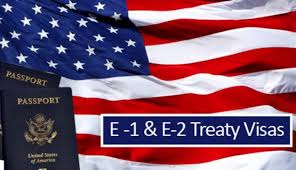Treaty Trader and Investor Visas

E-1/E-2 visa eligibility generally requires:
-
A treaty between the U.S. and a foreign country or Congressional act;
-
That majority ownership or control of the trading/investing company is held by treaty country nationals; and
-
That each employee or principal of the company seeking E status is a treaty country national.
Dependents (spouses and unmarried children under the age of 21) can join the E-1 or E-2 visa applicant in the United states for the duration of his/her stay. In this case, the dependent must apply for a derivative E-visa.
Treaty Trader (E-1) and Treaty Investor (E-2) visas are for citizens of countries with which the United States maintains treaties of commerce and navigation.
To qualify for Treaty Trader (E-1) and Treaty Investor (E-2) visas applicants must be coming to the United States either to engage in substantial trade, including trade in service or technology, in qualifying activities, which is principally between the United States and the treaty country, or to develop and direct the operation of an enterprise in which the applicant has invested a substantial amount of capital. Holders of E visas must intend to depart the United States upon the termination of their E status.
The spouse and unmarried children (under 21 years of age) of treaty traders, treaty investors, or employees of enterprises may receive dependent E visas in order to accompany or follow to join their spouse or parent. They are not required to have the same nationality as the principal applicant to obtain an E visa.
E visas permit the investor/trader and his or her family to live in the United States during the period of stay authorized by the Department of Homeland Security (DHS). E visas are nonimmigrant visas; consequently, visa holders are allowed to live in the United States only so long as the conditions under which the visa was granted remain valid. Dependents are not authorized to work in the U.S. unless they receive explicit authorization to do so from DHS-USCIS in the United States. Dependents of treaty traders/investors may apply for work authorization after their arrival in the United States.
Qualifications
Qualifications for a Treaty Trader (E-1) Visa:
-
The applicant must be a citizen of a treaty country;
-
The trading firm for which the applicant is coming to the United States must have the nationality of the treaty country, meaning persons with the treaty country’s nationality must own at least 50 percent of the enterprise;
-
The international trade must be “substantial”. There must be a sizeable and continuing volume of trade (trade means the international exchange of goods, services, and technology). Title of the trade items must pass from one party to the other;
-
The trade of the U.S. enterprise must be principally between the U.S. and the treaty country. More than 50 percent of the international trade involved must be between the U.S. and the country of the applicant’s nationality;
-
The applicant must be employed in a supervisory or executive capacity, or possess highly specialized skill essential to the efficient operation of the firm. Ordinary skilled or unskilled workers do not qualify. Please note that a detailed explanation of why the applicant’s skills are essential for the enterprise in the U.S. may be required;
-
The applicant must intend to depart the U.S. when his/her E-1 status ends.
Qualifications for a Treaty Investor (E-2) Visa:
-
The investor, either a person, partnership or a corporate entity, must have the citizenship of the treaty country. If a business, at least 50 percent of the business must be owned by persons with the treaty country’s nationality;
-
The investment must be substantial and the funds have to be “irrevocably” committed. The investment must be sufficient to ensure the successful operation of the enterprise;
-
The investment must be in a real operating enterprise. Speculative or idle investment does not qualify. Uncommitted funds in a bank account or mere ownership of undeveloped land are not considered an investment;
-
The investment may not be marginal. Based on 9 FAM 402.9, the enterprise must either show a financial return that significantly exceeds what is necessary to support a living for the investor or else the enterprise must have the capacity, present or future, to make a significant economic contribution;
-
The investor must be coming to the United States to develop and direct the enterprise. If the applicant is not the principal investor, he or she must be employed in a supervisory, executive, or highly specialized skill capacity. Ordinary skilled or unskilled workers do not qualify. Please note that a detailed explanation of why the applicant’s skills are essential for the enterprise in the U.S. or why the applicant possesses qualifying “executive or supervisory: experience may be required;
-
The applicant must intend to depart the U.S. when his/her E-2 status ends.
Contact one of our experienced immigration lawyers in New York today at 718-407-0871 or online at https://www.prizant-law.com if you need help with E-1 or E-2 visa or any other solutions to your immigration problems. We are prepared to build the strongest case possible in order to defend you against deportation.
Contributed by Svetlana Prizant, Esq., an Award Winning New York Immigration Lawyer
Call or visit Prizant Law at:
Prizant Law
118-21 Queens Blvd Suite 507
Forest Hills, NY 11375
(718) 407 0871
